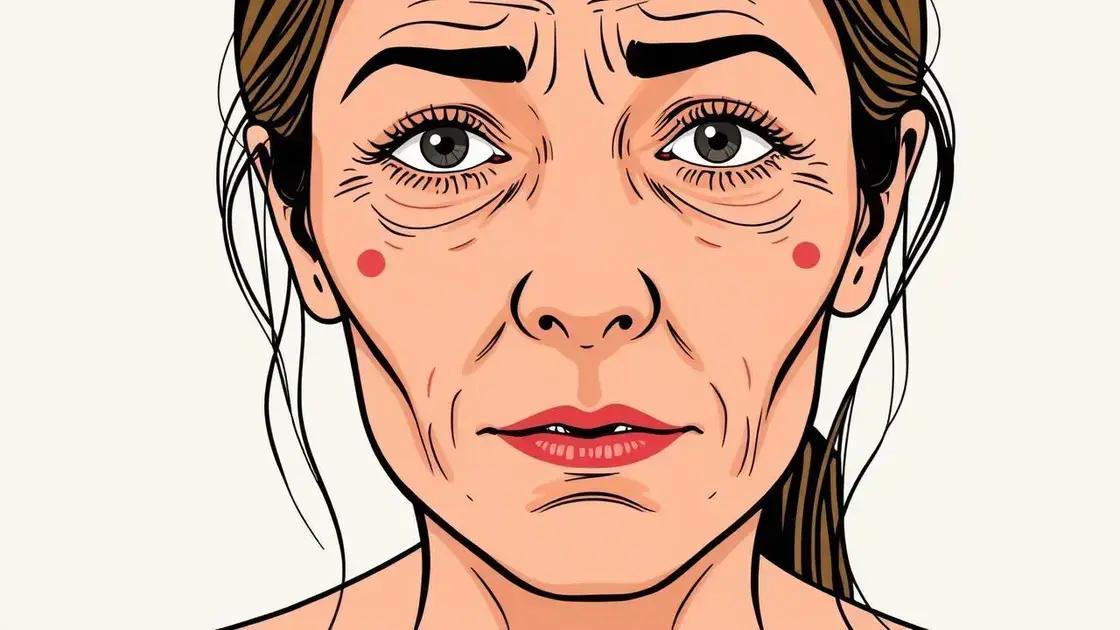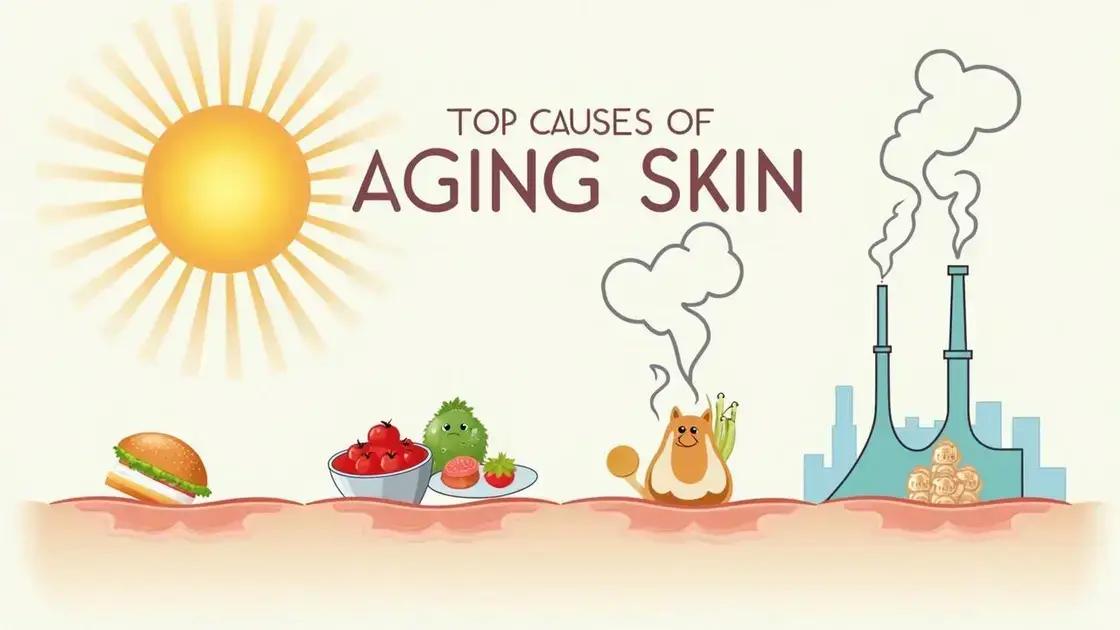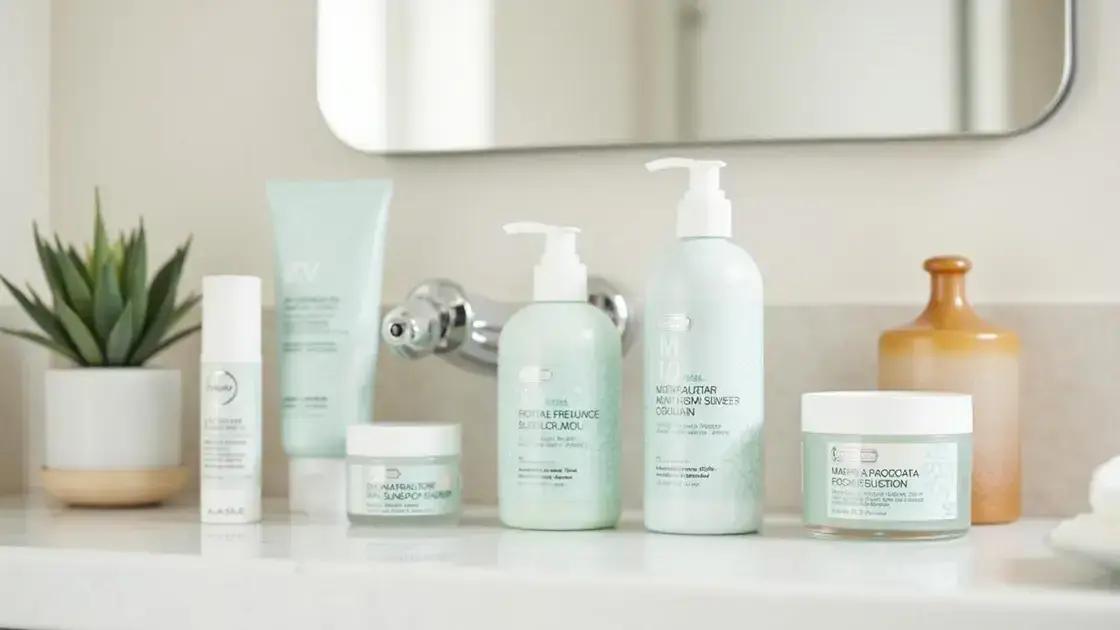To protect your skin from aging effects, it is essential to adopt a comprehensive approach that includes understanding the causes of skin aging, establishing an effective skincare routine, and making lifestyle changes such as staying hydrated, eating a balanced diet, exercising, managing stress, and using sun protection daily.
As we age, our skin undergoes various changes that can make it appear dull and damaged. Understanding how to protect your skin from aging effects is essential for maintaining a youthful glow. Many factors contribute to skin aging, including UV exposure, pollution, and poor diet. In this article, we will discuss effective strategies to combat these issues, including skincare routines and lifestyle adjustments, to help you achieve healthier, more vibrant skin that stands the test of time.
Understanding Skin Aging

Skin aging occurs naturally over time due to a variety of factors. It is crucial to understand how this process works to better protect your skin. As we age, our skin undergoes changes in structure, texture, and appearance. These changes can lead to wrinkles, fine lines, and a loss of elasticity.
What Happens to Our Skin?
Our skin consists of several layers, mainly the epidermis and dermis. The epidermis is the outer layer that provides a barrier and is constantly renewing itself. The dermis contains collagen and elastin, which give skin its firmness and elasticity.
With time, the production of collagen and elastin decreases. This reduction leads to thinning skin, making it more susceptible to damage. Additionally, the skin’s ability to retain moisture diminishes, resulting in dryness and rough texture.
Key Indicators of Aging Skin
There are several noticeable signs of aging skin. Common indicators include:
- Wrinkles: Fine lines develop around the eyes, mouth, and forehead.
- Age Spots: Sun exposure can cause dark spots known as liver spots or age spots.
- Loss of Firmness: Skin may feel looser, especially around the jawline and neck.
- Dullness: A decrease in skin cell turnover can lead to a lackluster complexion.
Factors Contributing to Skin Aging
Several factors can accelerate the aging process:
- Sun Exposure: UV rays can damage skin cells and accelerate aging.
- Smoking: Tobacco smoke can harm skin elasticity and color.
- Diet: Nutrient-deficient diets can impact the skin’s appearance and health.
- Dehydration: Inadequate water intake can lead to dry and flaky skin.
Understanding how these factors contribute to skin aging is vital for implementing effective protection strategies. By taking proactive steps, you can combat the signs of aging and promote a youthful appearance.
Top Causes of Aging Skin

Aging skin can be attributed to various factors that impact its appearance and health. Understanding these causes can help you make better choices for your skincare routine. Here are the primary culprits that contribute to skin aging:
Sun Exposure
One of the leading causes of skin aging is sun exposure. Ultraviolet (UV) rays can damage skin cells, leading to premature wrinkles and age spots. It is crucial to protect your skin by using sunscreen and avoiding excessive sun exposure.
Poor Diet
A diet lacking in essential nutrients can significantly affect skin health. Consuming fruits and vegetables high in antioxidants can help combat skin damage. Foods rich in healthy fats, like avocados and nuts, also support skin elasticity.
Smoking
Smoking is another major factor that accelerates aging skin. The toxins in cigarette smoke reduce blood flow to the skin, causing it to look dull and grey. Additionally, smoking decreases collagen production, leading to wrinkles and fine lines.
Dehydration
Dehydration can make your skin appear dry and flaky. When you don’t drink enough water, your skin loses its natural moisture. Aim for at least eight glasses of water daily to keep your skin hydrated and maintain its elasticity and suppleness.
Pollution
Environmental pollution can wreak havoc on your skin, introducing harmful free radicals that damage skin cells. Exposure to pollutants can result in accelerated aging and increased skin sensitivities. Regular cleansing and protective skincare products can help mitigate these effects.
By identifying these causes of aging skin, you can take proactive steps to protect and maintain your skin’s health and youthfulness.
Effective Skincare Routines

Having an effective skincare routine can help you protect your skin from aging effects. Incorporating the right products and steps can ensure your skin remains healthy and youthful. Here are essential components of an effective skincare routine:
1. Cleansing
Cleansing your skin is the first step. Use a gentle cleanser to remove dirt, makeup, and oils. Cleansing in the morning and evening helps keep your skin fresh and prevents clogged pores.
2. Exfoliating
Exfoliation helps remove dead skin cells and promotes cell turnover. Aim to exfoliate 1-2 times a week using a gentle scrub or a chemical exfoliant with ingredients like alpha hydroxy acids (AHAs) or beta hydroxy acids (BHAs).
3. Toning
A good toner can help balance your skin’s pH and tighten pores. Look for alcohol-free formulas that include hydrating ingredients like hyaluronic acid.
4. Moisturizing
Moisturizing is crucial to keep your skin hydrated. Choose a lightweight moisturizer in the morning and a richer cream at night. Ingredients like ceramides and glycerin can help retain moisture in the skin.
5. Sun Protection
Applying sunscreen daily is one of the best defenses against aging. Look for a broad-spectrum sunscreen with an SPF of at least 30. Apply it every morning, even on cloudy days.
6. Night Creams
Incorporating a night cream can boost skin repair while you sleep. Choose products containing retinol or peptides that stimulate collagen production and reduce fine lines.
7. Consistency
Consistency is essential for seeing results. Stick to your routine daily and avoid switching products frequently so your skin can adjust.
By following these steps, you can create an effective skincare routine that helps protect your skin from aging effects and enhances its overall health.
Lifestyle Changes for Youthful Skin

Making lifestyle changes can significantly contribute to maintaining youthful skin. Simple adjustments to your daily habits can help prevent skin aging and improve your overall health. Here are some key lifestyle changes to consider:
1. Stay Hydrated
Drinking enough water is crucial for your skin’s health. Aim for at least eight glasses of water a day. Staying hydrated helps keep your skin plump and reduces dryness.
2. Eat a Balanced Diet
Eating a nutritious diet rich in fruits, vegetables, and whole grains is essential for healthy skin. Foods high in antioxidants, like berries and leafy greens, can protect your skin from damage.
3. Exercise Regularly
Regular exercise improves blood circulation, which helps nourish the skin. Aim for at least 30 minutes of physical activity most days of the week. Exercise also reduces stress, which can lower the risk of skin issues.
4. Get Enough Sleep
Getting adequate sleep is vital for skin repair. Aim for 7-9 hours of quality sleep each night. A good night’s rest allows your skin to rejuvenate and recover from daily damage.
5. Manage Stress
High-stress levels can lead to skin problems. Practice stress-reducing techniques such as yoga, meditation, or deep breathing exercises. Finding time for hobbies and relaxation can improve your skin’s condition.
6. Avoid Smoking and Limit Alcohol
Smoking damages collagen and elastin, contributing to premature aging. Limiting alcohol can also prevent dehydration and skin puffiness. Avoid these habits to protect your skin.
7. Practice Sun Safety
Protecting your skin from the sun is crucial. Wear hats and sunglasses, and seek shade whenever possible. Use broad-spectrum sunscreen with an SPF of at least 30 to guard against harmful UV rays.
By making these lifestyle changes, you can help support your skin’s health and promote a youthful appearance.
Protecting Your Skin from Aging Effects
In summary, taking care of your skin as you age requires a multifaceted approach. Understanding the processes of skin aging, recognizing the key causes, and adopting effective skincare routines are essential. Additionally, embracing lifestyle changes can greatly enhance your skin’s health and appearance.
By prioritizing sun protection, hydration, and a balanced diet while reducing stress and avoiding harmful habits, you set the foundation for youthful, radiant skin. Stay consistent with your skincare regimen and make mindful lifestyle choices to achieve and maintain a vibrant complexion.
Your skin is a reflection of your overall health, so invest in it wisely, and you will reap the rewards for years to come.
FAQ – Frequently Asked Questions about Protecting Your Skin from Aging Effects
What are the main causes of aging skin?
The main causes of aging skin include sun exposure, poor diet, smoking, dehydration, and environmental pollution.
How can I create an effective skincare routine?
An effective skincare routine includes cleansing, exfoliating, toning, moisturizing, sun protection, and using night creams.
What lifestyle changes can help keep my skin youthful?
Staying hydrated, eating a balanced diet, exercising regularly, getting enough sleep, managing stress, avoiding smoking, and protecting your skin from the sun can help maintain youthful skin.
Is it important to use sunscreen every day?
Yes, using sunscreen daily is crucial for protecting your skin from harmful UV rays that can accelerate aging.
How often should I exfoliate my skin?
You should exfoliate your skin 1-2 times a week, depending on your skin type and the products you use.
What should I look for in a moisturizer?
Look for moisturizers that contain hydrating ingredients like glycerin, hyaluronic acid, or ceramides to help retain moisture in your skin.













